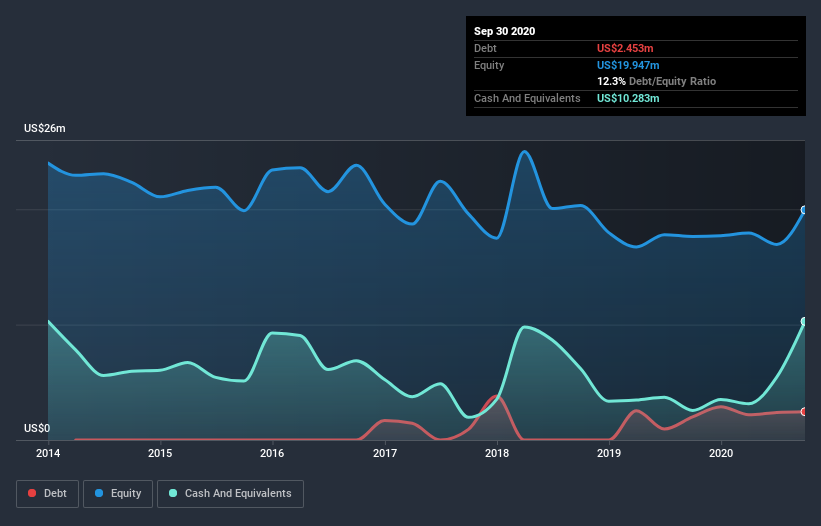Is eMagin (NYSEMKT:EMAN) Using Too Much Debt?

Some say volatility, rather than debt, is the best way to think about risk as an investor, but Warren Buffett famously said that 'Volatility is far from synonymous with risk.' So it might be obvious that you need to consider debt, when you think about how risky any given stock is, because too much debt can sink a company. We note that eMagin Corporation (NYSEMKT:EMAN) does have debt on its balance sheet. But the more important question is: how much risk is that debt creating?
Why Does Debt Bring Risk?
Debt assists a business until the business has trouble paying it off, either with new capital or with free cash flow. In the worst case scenario, a company can go bankrupt if it cannot pay its creditors. However, a more usual (but still expensive) situation is where a company must dilute shareholders at a cheap share price simply to get debt under control. Having said that, the most common situation is where a company manages its debt reasonably well - and to its own advantage. The first thing to do when considering how much debt a business uses is to look at its cash and debt together.
See our latest analysis for eMagin
What Is eMagin's Net Debt?
As you can see below, at the end of September 2020, eMagin had US$2.45m of debt, up from US$2.00m a year ago. Click the image for more detail. However, it does have US$10.3m in cash offsetting this, leading to net cash of US$7.83m.
How Healthy Is eMagin's Balance Sheet?
The latest balance sheet data shows that eMagin had liabilities of US$10.7m due within a year, and liabilities of US$6.00m falling due after that. On the other hand, it had cash of US$10.3m and US$3.21m worth of receivables due within a year. So its liabilities outweigh the sum of its cash and (near-term) receivables by US$3.22m.
Of course, eMagin has a market capitalization of US$74.1m, so these liabilities are probably manageable. Having said that, it's clear that we should continue to monitor its balance sheet, lest it change for the worse. Despite its noteworthy liabilities, eMagin boasts net cash, so it's fair to say it does not have a heavy debt load! When analysing debt levels, the balance sheet is the obvious place to start. But ultimately the future profitability of the business will decide if eMagin can strengthen its balance sheet over time. So if you want to see what the professionals think, you might find this free report on analyst profit forecasts to be interesting.
In the last year eMagin wasn't profitable at an EBIT level, but managed to grow its revenue by 17%, to US$29m. That rate of growth is a bit slow for our taste, but it takes all types to make a world.
So How Risky Is eMagin?
By their very nature companies that are losing money are more risky than those with a long history of profitability. And we do note that eMagin had an earnings before interest and tax (EBIT) loss, over the last year. And over the same period it saw negative free cash outflow of US$3.1m and booked a US$7.9m accounting loss. Given it only has net cash of US$7.83m, the company may need to raise more capital if it doesn't reach break-even soon. Summing up, we're a little skeptical of this one, as it seems fairly risky in the absence of free cashflow. The balance sheet is clearly the area to focus on when you are analysing debt. However, not all investment risk resides within the balance sheet - far from it. Be aware that eMagin is showing 4 warning signs in our investment analysis , you should know about...
If, after all that, you're more interested in a fast growing company with a rock-solid balance sheet, then check out our list of net cash growth stocks without delay.
This article by Simply Wall St is general in nature. It does not constitute a recommendation to buy or sell any stock, and does not take account of your objectives, or your financial situation. We aim to bring you long-term focused analysis driven by fundamental data. Note that our analysis may not factor in the latest price-sensitive company announcements or qualitative material. Simply Wall St has no position in any stocks mentioned.
Have feedback on this article? Concerned about the content? Get in touch with us directly. Alternatively, email editorial-team@simplywallst.com.

